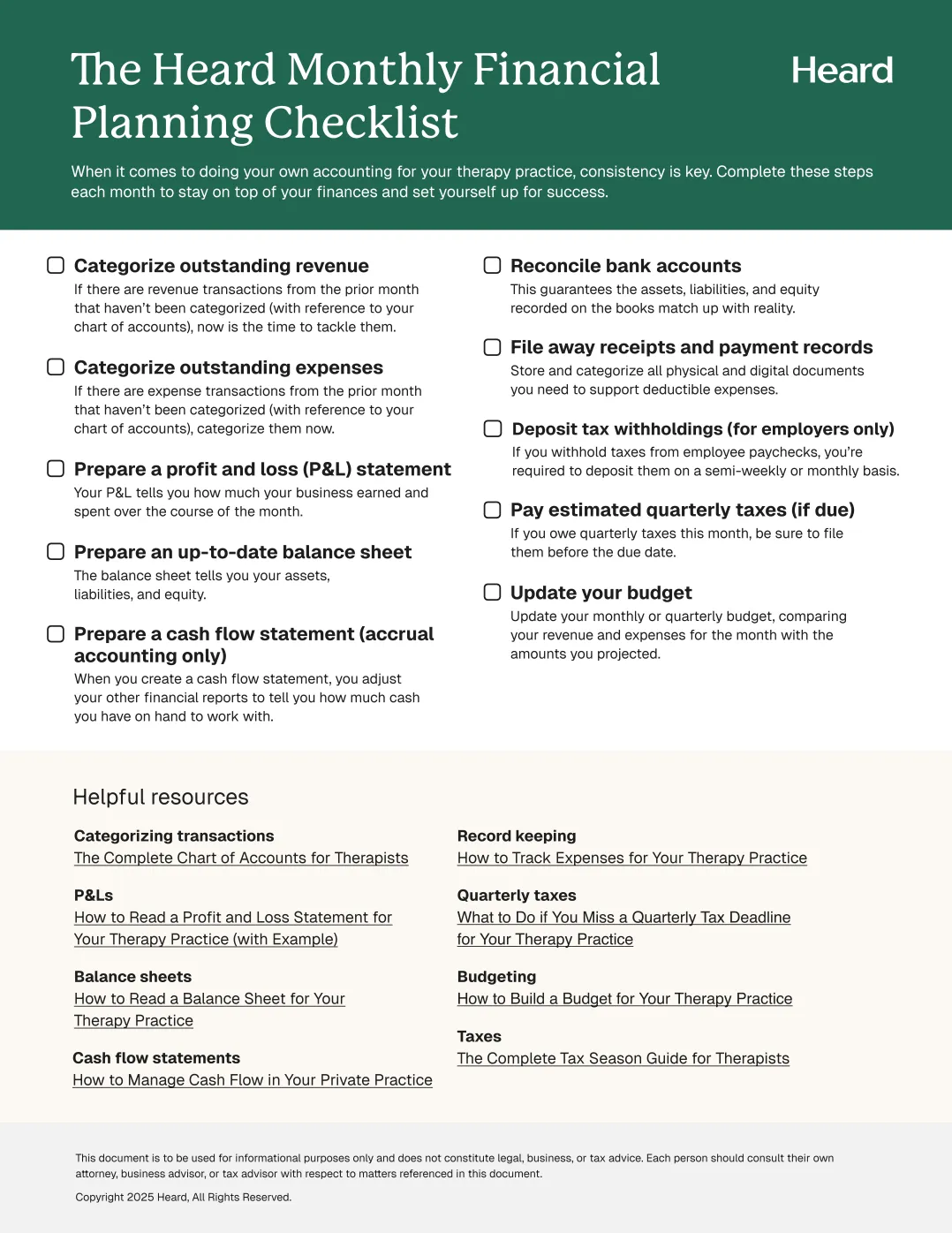The holiday blues are real. Travel plans, credit card debt, and nostalgia for simpler, more innocent Yuletides gone by may leave you feeling less than holly and jolly.
And when you run your own therapy practice, planning time away from work creates its own stressors.
But don’t go Grinch mode just yet. With a little planning, you can step away from your practice with the minimum amount of hassle—and maybe even snag some much-needed R&R.
Here are seven steps for planning your winter vacation as a self-employed therapist.
{{resource}}
1. Plan your leave and return dates far in advance
Before doing anything else, set dates for when you’ll be leaving and returning to the office.
When you’re dedicated to helping your clients and growing your practice, taking time off can create feelings of guilt. The farther in advance you block off time in your calendar, the less you’ll feel like you’re sneaking away or slacking off when the time comes. Winter vacation becomes just another part of the 12-month cycle.
It can also make it easier to enforce boundaries later on, in the event work threatens to encroach.
Bonus: if you’re planning to travel during the holidays, you may be able to save on the cost of airfare or hotel stays by booking well in advance.
There’s a chance it’s too late to take this step—sometimes, the holidays just seem to sneak up. In that case, fight procrastination and book off the time ASAP. (Or, if it’s really getting down to the wire, consider booking time off in January instead.)
2. Set your holiday budget
Beyond shopping expenditures and the electricity bill, how much do you expect to spend covering personal costs during your time away?
One of the biggest mistakes newly-self-employed therapists take when planning time away is overlooking cash flow. While you’re not working, you’re (probably) not earning your typical week-to-week income. So you need to plan how you’ll pay for food, gas, utilities, and other essential items.
That could mean:
- Planning how much you’ll spend from existing savings;
- Designating a credit card to cover expenses, and creating a plan to pay it down in the New Year; or
- Using savings you’ve already specifically put aside for the holidays.
Whatever plan you choose, the important thing is to create a real budget—a spreadsheet or written notes. When you own your own business, stress over personal finances has a way of leaking into your professional life. Keep yourself accountable, and the New Year will get off to a better start.
3. Create a savings plan if necessary
If you don’t have a pile of personal savings to fund your holiday vacation—or you’d simply rather not dip into them—the trick is to build a savings plan well before your time off arrives.
That could mean starting in July to set aside funds every week to eventually cover your time away. It may be hard staying disciplined when the holidays are still five months out, but it’s seriously satisfying to leave the office in December knowing your time away is paid for.
{{resource}}
4. Notify clients in advance
Notify your clients of your time away twice:
- Once, two or even three months before you leave; and
- A second time, one month beforehand
The first notification sets the groundwork, so nobody feels blindsided when you notify them later. And the one-month-to-go reminder gives them enough time to plan without being far enough away to procrastinate or forget.
(Naturally, your clients’ reactions and the amount of support they need will differ on a client-by-client basis.)
Your final notification to clients should come in the form of an email, and include:
- The precise dates of your absence
- Contact info in case of emergencies
- Hourly fees of the therapist covering you while you’re away
5. Get coverage for emergencies
Work with a fellow therapist to ensure they can cover your practice in case any of your clients need emergency mental health support.
Set up a meeting to determine their own availability and expectations, as well their hourly fee in the event they need to provide one of your clients with an emergency counseling session.
It’s not uncommon for therapists to cover one another’s practices reciprocally, i.e. your fellow therapist may ask you to cover their summer vacation later in exchange for them covering your winter vacation now.
If you plan to be away longer than two weeks, you may want to offer clients the chance to see your coverage therapist for their weekly or biweekly counseling sessions. Supposing you go that route, you’ll need to take time to meet with the therapist covering you to brief them on the relevant clients and provide treatment notes.
6. Plan and complete last-minute tasks
Set yourself a deadline and, if necessary, schedule extra work hours to complete final tasks before going on vacation.
If you’re thorough now, you won’t have any leftover work nagging your conscience while you take time away from the office. Be sure to:
- Catch up on patient notes
- Make sure your bookkeeping is up to date*
- File expense receipts for safekeeping
- Send out invoices
- Settle unpaid bills
* Depending upon when you return from vacation, you may need to close the books and generate year-end financial reports when you get back. If that’s the case, making sure your books are up to date now will save you a lot of hassle later on.
7. Set up your auto-replies
Finally, before you turn off your devices and enjoy some much-needed downtime, create:
- An auto-reply message for your email account
- A vacation voicemail message for your phone
- A sign for your office door (if applicable)
Each message should include:
- The dates you’ll be away
- Emergency contact information for the person covering you
- A promise to respond to all messages once you return to work
Once your auto-reply messages are set up, you should feel comfortable stepping away and enjoying your time off.
—
As soon as January 1st arrives, tax season begins. For help staying organized and making smart year-end tax moves, check out our Tax Hub for therapists.
This post is to be used for informational purposes only and does not constitute legal, business, or tax advice. Each person should consult their own attorney, business advisor, or tax advisor with respect to matters referenced in this post.
Bryce Warnes is a West Coast writer specializing in small business finances.
{{cta}}
Manage your bookkeeping, taxes, and payroll—all in one place.

Discover more. Get our newsletter.
Get free articles, guides, and tools developed by our experts to help you understand and manage your private practice finances.





